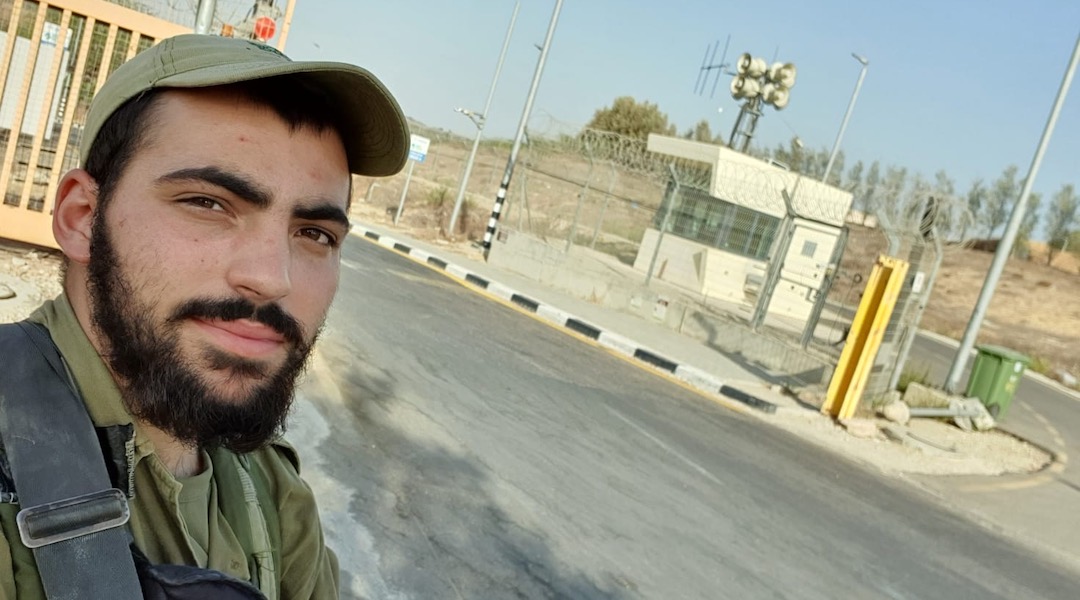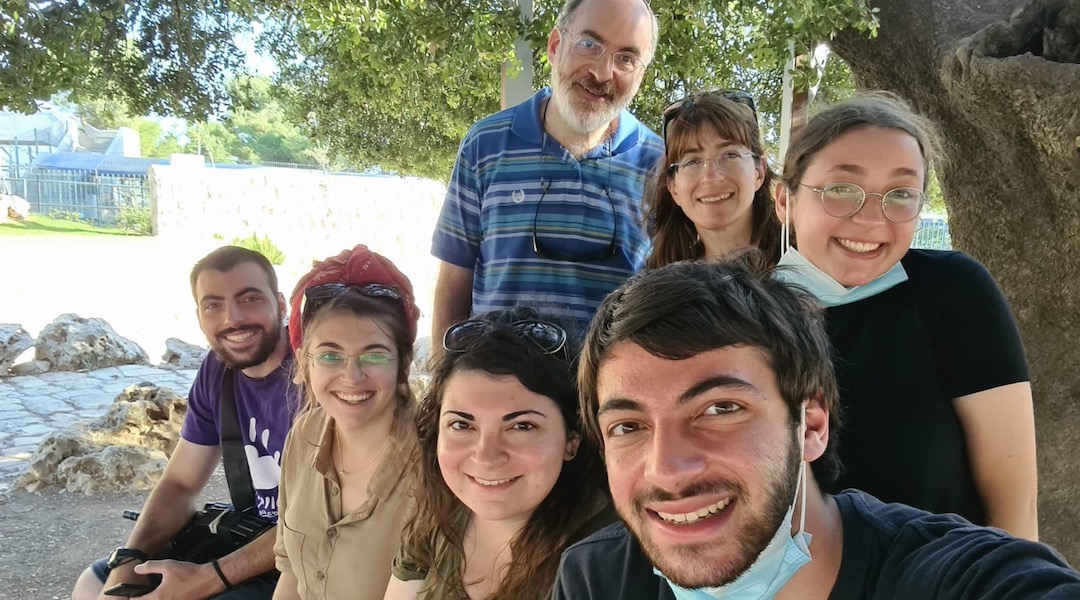(JTA) — I have five children, in very different stages of life, scattered across our home country of Israel. From young married down to high school student, with a soldier in the middle, they spend their weeks in their individual pursuits. Most find their way home for Shabbat.
But our usual weekly flow has been seriously disrupted by the current pandemic, and it was magnified in recent weeks as we faced the fall holidays under lockdown to prevent the spread of the coronavirus.
I work from home, so the coronavirus crisis has not interrupted my personal routine. But I’ve looked on as the rest of my family has been not only been touched by the pandemic, but hit over the head with it — in ways that illuminate the wide-ranging and devastating consequences that are unfolding across the country where I have lived since 2000.
Take my middle child and first son. Just hours before the start of Yom Kippur, the Israel Defense Forces announced that all combat units and all soldiers in training could not leave for at least the next month. It’s because nearly 1,200 soldiers, officers and other army employees currently have confirmed cases of the coronavirus and over 13,000 more are in isolation after coming into contact with someone who has the virus.
My son is both: He is in a combat unit and in training, at its very end. He returned to the army and a stint of guard duty following Rosh Hashanah and was scheduled to come home for Simchat Torah in a few weeks. Instead, we’re hoping he can make the goodies that I sent back with him last at least a month.
By now we are used to this. Coronavirus has affected every part of his army service. He was inducted one week after Purim, as the country began locking down. My husband and I, and most of the new inductees’ parents, were not able to accompany our son to the induction center in Tel Aviv and join in the kiss and cry frenzy. Instead of his coming home for the first Shabbat, he was told to bring enough supplies for a one-month stay on the base. It was actually six weeks before we saw him again
His swearing-in ceremony — “hashbaah” — usually a daylong family event, was broadcast on Facebook. But he was not even able to participate with the rest of his unit because he was in isolation after being exposed to a soldier with a high fever. His beret ceremony, signifying the end of his training, is set for the end of next month. We parents have already been informed that we are not invited.
All of these changes are prudent, but that does not stop the WhatsApp group of parents for my son’s unit (yes, we have one!) from going crazy with messages from distraught and angry mothers — moms who are already under significant pressure from the crisis in their own homes. They know the army is only trying to continue functioning while keeping the boys safe, but it’s just not normal.
The coronavirus has been the soundtrack of my family’s life since its first appearance here. My husband is a doctor of internal medicine at a major research and teaching hospital in Tel Aviv. His department was the first to set up for and receive coronavirus patients at his hospital, and it was a scary and exhausting time. His staff worked in “capsules,” and he was either at the hospital or on the phone with the hospital at all hours. He and his staff have been rotated out of coronavirus for the time being, but with more and more units being transitioned to care for the soaring number of coronavirus patients, his department is at way more than 100% capacity.
We knew that with a soldier and doctor at home, our family would be on the front lines of Israel’s battle against the coronavirus. What I hadn’t anticipated was how much the resurgence of the virus in our country would affect the rest of us, too.
Also in the hours before Yom Kippur, a message from our mayor informed us that our small community, a mixed religious-secular town, had over 57 COVID-19 cases per 10,000 residents, well above the national average. With that dubious distinction, the mayor canceled all indoor Yom Kippur services, even those following the tight coronavirus rules, and holiday services, such as the street minyans that have sprung up throughout the community. The exceptions were in areas designated by and supervised by the municipality.
Again, no real surprise. Within the first two weeks of the school year, three local elementary schools had to be closed after several staff members came down with the virus and most of the children were sent into isolation — with their parents and siblings because they were so young. The coronavirus also spread like wildfire through the youth of the community, who could not give up meeting together in local parks and on street corners.

Marcy Oster’s son takes a selfie on guard duty near the Israel-Gaza border. (Courtesy of Oster)
My younger son returned home from his yeshiva hours after Yom Kippur’s end. He has been learning in a capsule since he entered Yeshivat Har Etzion in August. Members of his capsule wear purple rubber bracelets to identify themselves and ensure they don’t mix with the hundreds of other students in their yeshiva. There are several other capsules, including one for the American program.
They study together, eat together and spend off hours together; they are not allowed to leave the yeshiva. If and when they return to the yeshiva after Sukkot ends late next week, they will stay in their capsules and won’t be able to come home again for a long time.
The approach has been quite successful in keeping the pandemic at bay in his yeshiva, even as several others have had outbreaks.
Prior to the start of the second lockdown in Israel, just hours before Rosh Hashanah, my middle daughter and son-in-law moved in with us. They had planned to be with us for Rosh Hashanah — they had spent the Passover Seder and the whole holiday alone, so they did not want to be away from family for these holidays. They plan to be with us until the end of Sukkot or the end of the lockdown, which could extend for weeks after.
Each day my daughter, in her first year of teaching, turns on her computer and connects to her elementary school students through Zoom. Keeping the attention of dozens of third-graders has not been easy, and it’s been an inauspicious start to her teaching career. I’m not sorry that she is no longer teaching in person though, to be honest. By the end of her second week, 21 teachers at her school were in isolation after being exposed to an infected colleague. And many of her young students could not keep masks on.
My youngest daughter is in the 11th grade. Each morning she wakes up, gets dressed and connects to Zoom for school. She spent one week at her high school before returning home for distance learning. A social being, she misses her school friends and friends in the community, who she is not allowed to meet with in person for fear of coming in contact with another teen with the coronavirus. A counselor in the local Bnei Akiva youth group, she has been forced to meet with her group of 30 fifth-graders on Zoom and stay in touch with them by phone and WhatsApp. She is finding it hard to accept that the special 11th-grade variety show, the one the students work on all year, probably won’t happen. Nor will the school trip to Poland. And forget the class trip to Eilat.
My oldest daughter also moved from her Jerusalem apartment to our home before Rosh Hashanah to ride out the lockdown. A graduate student working on her doctorate in immunology, she had to put her live cancer cell experiments on ice because she is not permitted to return to her lab until the end of the lockdown. Many of her friends have been pressed into service processing coronavirus tests. A teaching assistant at Hebrew University, she will conduct her classes online. It’s the first time she has lived at home for an extended period of time in eight years.
So we are a full house. I have to go grocery shopping every other day (masked and with hand sanitizer sticking out of my purse). The strain on our internet has been great. And while it is often amazing and fun to have almost our whole family under one roof, well, sometimes it’s a little crowded.
And if the pressure that everyone is under here isn’t enough, I have a mother that still lives in my hometown of Cleveland. She would love to have me visit there or come to visit me, but we have shut down our borders, again, making such a visit impossible for the duration of the current lockdown — and even longer over fear of one or both of us catching the coronavirus because of the visit.
Eventually my oldest daughter will return to her Jerusalem apartment and even her lab. The young marrieds will need their space. My son will return to his yeshiva, unable to return for an undetermined length of time. My youngest daughter will continue to miss both her friends and siblings. My son’s army uniforms will need a good washing and parents will clamor for their soldier children to come home for the weekend, where we will have to keep him isolated from his friends before sending him back. My husband will rotate back into the coronavirus unit.
When can we all be together again under the same roof? I don’t know for sure. We have no idea how long this will last.
On Wednesday, the Israeli media reported that Prime Minister Benjamin Netanyahu told his coronavirus cabinet that we will exit this lockdown slower and more gradually than the first time and that the full lifting of the lockdown could take a year. On the same day, Israel reported a record number of confirmed coronavirus cases, nearly 9,000, with the number expected to keep climbing.
My family has been adhering to the coronavirus regulations established by the government since the start of the pandemic. Clearly not all of my fellow countrymen have followed suit. As I appreciate the time with my family, despite our close quarters, and worry about a death toll that is now larger than the number of terror victims in Israel’s history, I will continue to wonder what damage this crisis is doing to Israel, and what divisions we will have to overcome, once we can again come together.
JTA has documented Jewish history in real-time for over a century. Keep our journalism strong by joining us in supporting independent, award-winning reporting.







